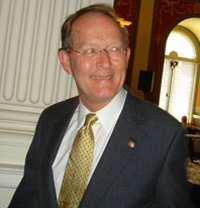Sen. Lamar Alexander (R-Tenn.), a day after he announced that he is not willing to work with Democrats on a climate change bill and instead unveiled his own nuclear-power-heavy proposal, is going out of his way to be a thorn in the side of Senate Democrats.
During two hearings on Tuesday convened to focus on the role of agriculture and transportation in reducing global warming emissions, Alexander and environment committee chair Barbara Boxer (D-Calif.) exchanged heated words about his plan to ramp up nuclear power.
Alexander said he does, in fact, want to do something about climate change. “I am one senator who thinks climate change is a problem, humans are causing it, and we need to deal with it,” he said, before launching into his list of complaints about the climate bill passed by the House.
“Cap-and-trade deliberately raises price of energy … We need to stop and think about whether it is the wisest policy to deal with climate change,” he said. He compared the House approach to “having a fly in front of you … and instead of using a fly swatter you use a noodle” to kill it. In a second hearing on Tuesday, he called the House-passed bill a “byzantine construction of taxes and mandates.”
Instead, Alexander wants Congress to put in place a “low-carbon fuel standard,” which he said would “not deliberately raise the price of gasoline.” And Congress should mandate the construction of 100 new nuclear power plants over the next 20 years, as he proposed yesterday.
“That’s the cheap energy solution,” he said. “A high cost solution like Waxman-Markey would be the expensive solution.”
Boxer, who is leading the Democrats’ efforts to draft a climate bill, fired back, saying Alexander’s plan isn’t really cheap at all. As noted here yesterday, operating 100 new nuclear reactors would cost $1.9 trillion to $4.1 trillion more over the life of the reactors than generating the same amount of electricity from other renewables and energy efficiency. “You don’t seem to mind [consumers] paying higher bills to build new nuclear plants,” said Boxer, pointing out that Alexander’s plan does not include tax credits or other incentive programs to defray upfront costs to consumers for new nuclear power plants. The Tennessean’s plan, she said, “would make them carry the whole burden.”
Boxer noted that most estimates of how energy use would change under the House climate bill predict that 100 new nuclear plants will be built over 20 years already, without giving the technology an artificial advantage in policy. She was echoed by witness Fred Krupp, president of the Environmental Defense Fund. “Let the free market, once we put a price on carbon set by the free market, decide what technologies,” said Boxer. “You’re coming forward with a command and control system, you’re picking winners. I am saying I think the marketplace should work through a cap-and-trade system.”
For the most part, Alexander’s rants against the cap-and-trade plan favored by most Democrats conflicted with some of the arguments he’s using for his plan. For example, he insisted that cap-and-trade would raise energy costs, but that a low-carbon fuel standard would somehow come free of additional costs, which is simply not the case. Also important is that low-carbon fuel standards are designed to serve as a complementary policy to other emissions-reductions plans, not as a single solution. But throughout the day’s two hearings, Alexander remained singularly focused on the ideas he put forward in his own plan, a proposal that has yet to receive a stamp of approval from the full Senate GOP caucus.
At one point Alexander sparred with EDF’s Krupp, seeming to argue simultaneously that there shouldn’t be any increase in the price of transportation fuels and that a mere 2 cents per gallon per year rise in gas prices (the amount the EPA predicts would happen under the Waxman-Markey bill) would not do enough to curb people’s driving habits. Krupp grew visibly frustrated by the exchange. “We should talk about how a cap-and-trade plan works,” he said, adding that the point is not to make driving more expensive — the point is to reduce emissions. “I don’t care whether it happens from reduced driving,” said Krupp. “I care that the carbon goes down.”
Tuesday’s hearings made it quite clear that Democrats shouldn’t hope for Alexander’s cooperation on drafting a climate bill.



